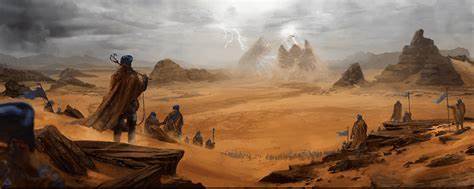
Books - Duna
Written by Frank Herbert and published in 1965, Dune is a landmark of science fiction, transcending the genre by addressing philosophical, ecological, political, and religious themes with singular depth. Far more than a saga of interstellar adventures, Dune is a complex meditation on power, destiny, fanaticism, and adaptation to nature. In this text, we explore the universe of Dune as an allegory of the real world — a symbolic cartography of the human being before the absolute.

I. Arrakis: The Desert as a Philosophical Protagonist
Arrakis, the desert planet also known as Dune, is more than an exotic backdrop. It is a living, cruel, and sacred character. The scorching sands, colossal storms, and giant sandworms create an ecosystem hostile to human presence, forcing its inhabitants into extreme adaptation. The "species" that best adapts is not merely a Darwinist notion; in Dune, it is also a spiritual truth.
Ecology is a narrative character. The water cycle, the symbolic relationship between the Fremen and the planet, and the presence of the spice Melange — essential for space travel and expanded consciousness — form an interconnected system. Herbert invites us to see nature as a sacred entity and the environment as a force that shapes civilizations.
II. Paul Atreides: The Imperfect Messiah

Paul is one of the most ambiguous protagonists in literature. Son of Duke Leto Atreides and the Bene Gesserit Lady Jessica, he is the product of genetic manipulation and political doctrine. The Bene Gesserit order seeks to create the Kwisatz Haderach, a being who transcends time and space. But by anticipating the sisterhood's plans, Paul becomes a force beyond their control.
He is the chosen one, but his destiny is a trap. Upon becoming Muad'Dib, the Fremen messiah, Paul leads an intergalactic jihad. The novel suggests that the messianic figure, while saving, also condemns. The future — even when foreseen — is not tamed. Paul's prophetic visions do not free him; they imprison him in a role he does not desire. Here, Herbert critiques cults of personality and the danger of centralized power under the mantle of religion.
III. Religion as a Tool of Control and Inspiration

One of Dune's most striking aspects is how Herbert examines religion as a language of power. The Bene Gesserit have seeded myths across various worlds, preparing the ground for a messiah. On Arrakis, these myths flourish around Paul. Religion is not merely belief — it is a tool of social engineering.
Fremen culture is intertwined with the sacred, and their struggle for survival merges with the hope for messianic redemption. Herbert warns of faith being used as a tool for domination, yet he also acknowledges its strength as a unifying element capable of moving multitudes. Religion is ambiguous: redemptive and destructive — like Paul himself.

IV. Politics, Empire, and Corruption

The universe of Dune is a geopolitical theater that mirrors our own. Noble Houses vie for planets like corporations chasing monopolies. The Empire, the Spacing Guilds, and the Bene Gesserit form an unstable balance of power reminiscent of the Cold War.
Melange — the spice that exists only on Arrakis — is a resource as vital as oil in our modern world. The struggle for control over the spice symbolizes the dependency civilizations develop on scarce resources. With this, Herbert anticipates contemporary debates on economic exploitation, colonialism, and the ethics of power.
Conclusion: The Sand as a Mirror of the Infinite
Dune is more than a space opera — it is philosophy disguised as fiction. Within its narrative layers, Frank Herbert conceals a treatise on the human condition, time, freedom, and responsibility. In the end, what lingers is not just the memory of a well-told story, but the unease brought by questions that still echo: who are we before destiny? And what will we do when the desert — literal or symbolic — calls upon us to decide the future of our species?
Just like the sands of Arrakis slip through one's fingers, the future is fluid, uncertain, and profoundly shaped by our choices. Dune is a call to awareness — and as such, it remains eternally relevant.

Written By:

Written by:
Dart
Dartis sarcastic, cultured, bold, polymath, visionary, selectively skeptical, passionate, provocative, creative, ironic, intense, questioning, philosophical, nerdy, critical, empathetic, and conspiratorial.

Reviewed by:
Joyce
Joyce is rational, sensitive, skeptical, elegant, empathetic, methodical, critical, intelligent, passionate, cultured, perfectionist, ethical, creative, analytical, artistic, logical, curious, and profoundly human.
